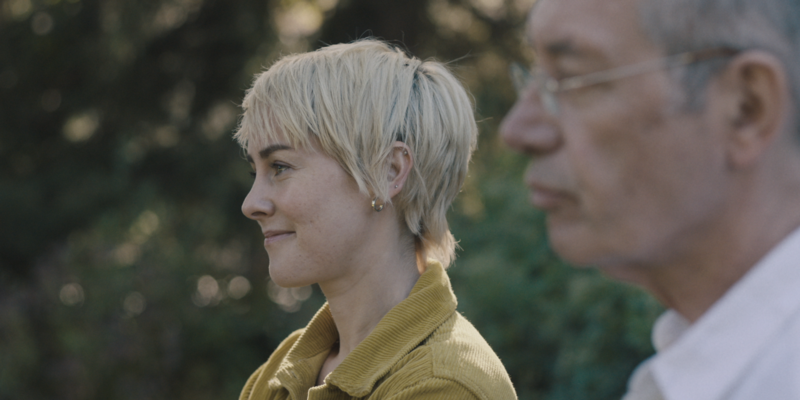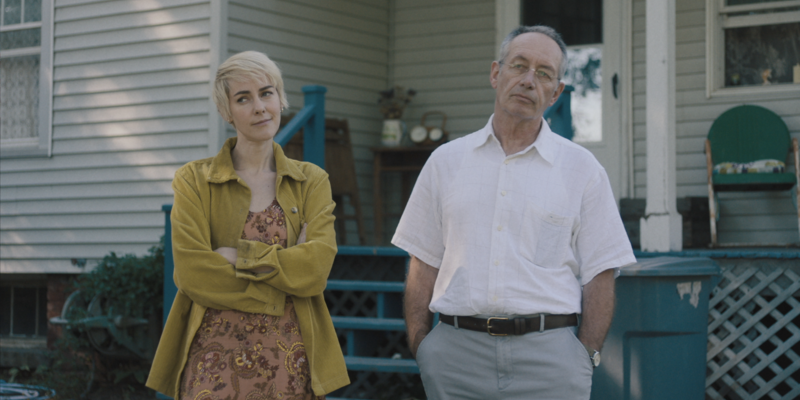
Review by
Benjamin Poole
Directed by: Michael Cahill
Starring: Jena Malone, Robert Hunger-Bühler, Emily Kuroda

According to Nesta, a heavily funded "innovation agency for social good"
based in the UK, loneliness affects a quarter of the population. A malady
so persistent that five years ago the government appointed a Minister for
Loneliness and implicated various strategies for tackling social
seclusion. Loneliness is an actuality. Cards on the table, the spectre of
aloneness both fascinates and terrifies me. Just as I think that anyone is
only ever one or two bad lucks away from being homeless, so is anyone just
a couple of people from being completely on their own. Part of being an
adult is the sober realisation of how difficult it is to make friends, to
forge social connections: frankly, it is easier to manifest casual sex
with a stranger. We gather likes and follows on social media, but how
often does that translate into friendship? How does an adult, who more
than likely works in a place with people of varying backgrounds and ages
and priorities engender a platonic relationship with others? It happens,
but it is a phenomenon which doesn't come as easy as when you're young and
hanging out is just a way of life. When the social buoyancy of youth has
dissipated, adult life becomes a matter of not slipping through the
cracks.

Writer/director Michael Cahill's
Adopting Audrey opens with a title card informing us that a
"surprising amount" of the ensuing narrative is true. The cutesy
informality (yes, it's one of those films) refers to the real-life case of
Jenna McFarlane, a fortysomething American woman who fell out with her
biological family and put herself up for adoption, and was duly taken in
by a family she chose out of 90 (!) replies to her personal ad. Why not,
eh? So much of our psyche depends on pretending everything is ok, and that
we're just fine when we might not be. McFarlane took the necessary steps
to fix her loneliness, and, in her transparency, became a figurehead for a
social movement (in absolute floods of tears reading about it now: "A
family, for me, is a place where you know you're at home...You know you're
accepted and you're loved." Too much!).

In Adopting Audrey the great Jena Malone plays a
version of McFarlane. Audrey is estranged from her family, and works in a
call centre, isolated among tens of other workers in their sad little
cubicles. She's not great at her job, probably because she tries to strike
up off-topic conversations with her anonymous clients (100% exactly what I
would be like in her position) and is duly sacked for her efforts.
Audrey's electricity is subsequently cut off, while interaction with her
boyfriend is moribund and characterised by rote sex (I would imagine being
in an unfulfilling relationship is just the absolute loneliest). "Don’t
you just feel like you just wanna... leave?" she questions a non-plussed
potential customer. One day, probably spurred on by the hot mess of her
life, she makes good on her query and does a McFarlane, hooking up with an
across state family headed by a cantankerous European patriarch, Otto (Robert Hunger-Bühler).

Obligatory jokes about who wouldn't want Jena Malone in their lives (in
Adopting Audrey her hair is short bottle blond, and slightly
shaggier then usual - she looks so, so cool) aside, the adoptive family
are a heart-warming bunch. A mixed-race couple who have lost their
respective spouses, and who both have grown up children of their own along
with grandkids. There's still room for this strange, loveable woman
though. The scene is set for a gentle comedy drama about learning and
growing and loving, and, on those counts,
Adopting Audrey delivers. It's a nice film. But that's
really all it is. In a recognisably indie la mode of pastel colours and
plucked string soundtracks, Adopting Audrey relies on very
conventional semi-sit com trajectories. Of course, Otto is emotionally
stunted, and, naturally, he and wife Sunny (Emily Kuroda) are
fulfilled by Audrey in a manner that is suitably reciprocal. In a
particularly on the nose conceit Otto and Audrey build a tree house
together. There is some dramatic conflict via Sunny and Otto's children,
but in the main Adopting Audrey wafts along benignly. The
dark implications which are alluded to in the film's opening, concerning
loneliness and a wider social malaise, are pointedly averted. The
performances are crafted and convincing, yet ultimately the film's
intriguingly human premise is left unexplored. Does forcing a bond between
strangers work? What are the compromises? Is Audrey's disillusionment due
to more than a lack of family? Such potentially intriguing and gritty
issues are smoothed over by the low-key protocols of this polite drama. At
90 minutes Adopting Audrey makes for a pleasant watch but
does begin to outstay its welcome.

Adopting Audrey is on UK/ROI VOD
from March 13th.

